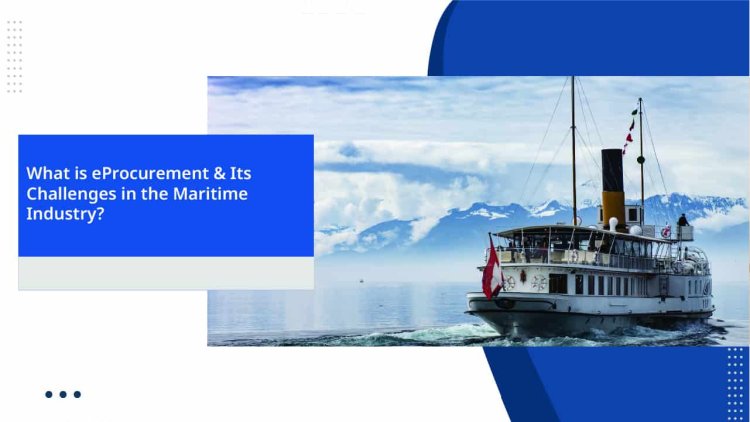What is eProcurement & Its Challenges in the Maritime Industry?
Electronic procurement, commonly known as eProcurement, has emerged as a transformative solution for efficient and streamlined supply chain management. With the advancement of technology, industries across the board have embraced eProcurement practices to enhance their procurement processes and drive cost savings.
Share this Post to earn Money ( Upto ₹100 per 1000 Views )

With its unique characteristics and operational challenges, the maritime industry is no exception. However, the maritime sector faces specific hurdles and complexities when it comes to implementing and optimizing electronic procurement practices.
In this article, we look into the concept of eProcurement, exploring its significance in the maritime industry and the distinct challenges that procurement professionals face in this domain. By understanding these challenges and exploring potential solutions, we can pave the way for more effective and efficient procurement practices within the maritime sector.
Benefits of eProcurement in the Maritime Industry
- Cost savings through efficient sourcing and supplier management: eProcurement enables maritime companies to negotiate better prices and terms with suppliers, streamline sourcing processes, and consolidate purchasing volume, leading to significant cost savings and improved profitability.
- Streamlined procurement processes and reduced paperwork: eProcurement automates requisitioning, purchase order creation, and invoice processing, eliminating manual tasks and paperwork. This streamlines the procurement cycle, reduces processing time, and increases efficiency, allowing procurement professionals to focus on strategic activities.
- Improved transparency and visibility in procurement activities: eProcurement provides a centralized platform that offers real-time visibility into procurement activities. Stakeholders can track requisitions, purchase orders, and deliveries, enabling better coordination, communication, and proactive management of potential issues. This fosters transparency, trust, and smooth operations throughout the supply chain.
Unique Challenges of eProcurement in the Maritime Industry
Complex procurement requirements due to vessel operations and routes: The maritime industry has unique procurement requirements due to vessel operations and routes. Vessels’ specific equipment and spare parts needs, as well as variations in voyages, cargo types, and vessel specifications, add complexity. Procurement professionals must manage inventory, coordinate with multiple suppliers, and adapt strategies to meet vessel-specific demands.
Data management in a maritime setting: Data management holds significant importance in the maritime industry. Compliance with data protection regulations and the implementation of robust data management practices are essential to safeguard procurement data and facilitate seamless transactions in the maritime setting.
Overcoming Challenges in Maritime eProcurement with Shipmate’s Ship Procurement System
A Ship Procurement System provides specialized solutions to address the unique challenges the maritime industry faces. By leveraging its capabilities, maritime companies can optimize procurement operations. Here is how the Ship Procurement System empowers maritime organizations to navigate eProcurement complexities and achieve procurement excellence.
- Route-Specific Sourcing: The system provides the capability to handle complex procurement requirements based on vessel operations and routes. It allows procurement managers to source and manage supplies specific to each vessel’s needs, taking into account their unique operational requirements.
- Enhanced Data Security: Shipmate’s system incorporates robust data management and security measures tailored for the maritime setting. It includes features such as data encryption, access controls, and regular backups, ensuring the confidentiality and integrity of procurement data.
- Inventory Tracking: The system enables effective tracking of inventory across vessels and remote locations. Procurement managers can monitor stock levels, track usage, and plan replenishment based on real-time inventory data, even in areas with limited connectivity.
- Supplier Compliance Management: Shipmate’s system includes features for managing supplier compliance in the maritime industry. It allows procurement managers to track and verify suppliers’ adherence to industry regulations, certifications, and quality standards, ensuring the selection of reliable and compliant vendors.
Shipmate’s Procurement Management System offers powerful features to enhance eProcurement in the maritime industry. It includes automated approval workflows, real-time collaboration capabilities, integrated reporting and analytics, vendor performance evaluation tools, and mobile accessibility. These features enable streamlined procurement processes, efficient communication, data-driven decision-making, supplier assessment, and accessibility on the go. With Shipmate’s system, maritime organizations can optimize their eProcurement operations, foster collaboration, and drive efficiency.
Final Thoughts
eProcurement offers significant benefits as well as challenges to the maritime industry. Overcoming these challenges is crucial for maritime organizations to harness the potential of eProcurement fully.
By adopting tailored solutions like Shipmate Ship Procurement Systems, maritime companies can address the specific challenges they face. These systems provide features like automated workflows, real-time collaboration, and data analytics, enabling efficient and secure procurement operations.
Want to learn more about how to streamline your maritime eProcurement processes and overcome industry challenges? Get in touch with us or request a free demo to see how our comprehensive Ship Procurement System can be a game changer for your operations.
















